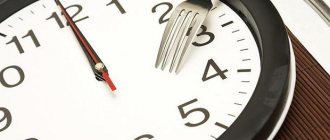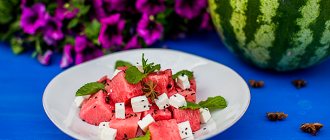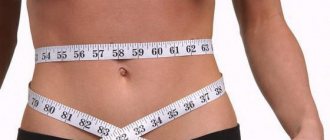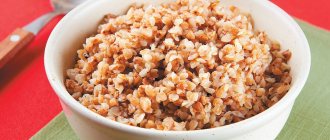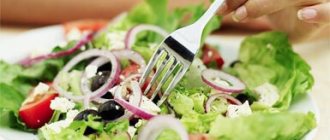What time can you have dinner?
When planning your last meal, you need to focus not on a specific time, but on the upcoming interval between dinner and breakfast. Fasting for too long is unacceptable - sharp jumps in insulin will lead to increased appetite and overeating. However, eating a heavy meal immediately before bed should also be avoided. A heavy evening meal unnecessarily loads the digestive system, forcing the body to work hard instead of getting quality rest.
Taking too long a break between dinner and breakfast will lead to overeating the next day.
Nutritionists recommend having your last meal 3 hours before bedtime. So, if a person is used to going to bed at midnight, dinner should be at 21.00. During this time, the food will be completely digested in the stomach, but a serious feeling of hunger will not yet occur.
Children, pregnant and lactating women should have dinner 2-2.5 hours before bedtime.
This advice is not suitable for athletes involved in bodybuilding - building muscle mass involves eating dense meals at regular intervals, including before bed.
Good nutrition is the key to health
Satisfying hunger is one of the basic human instincts that guarantees the maintenance of life. That is why it is extremely important what we eat, at what time and in what quantities. The foods you eat directly affect your health. Improper nutrition is fraught with damage to both individual human organs and the entire body. Such disastrous results can be caused by food that is defective in its composition, or by its lack or excess. Therefore, it is very important to pay due attention to your nutrition.
What's best to eat for dinner?
First of all, you need to start from the distribution of calories throughout the day. Dietitians call the following ratio of the daily diet:
- Breakfast 30-35%;
- Lunch 40-45%;
- Dinner 20-30%.
As can be seen from the above data, dinner should be the lightest meal of the day. But you shouldn’t go to extremes - a glass of water or lettuce leaves are unlikely to satisfy your evening hunger, and the emptiness in your stomach will prevent you from falling asleep. For proper rest, the last meal should be nourishing and balanced.
Dessert time - 19:00 - 20:00
There are people for whom it is extremely important to end their meals on a sweet note. And many people prefer cakes, pastries and other not-so-healthy delicacies. Nutritionists say: eating foods like fruits is much better for your body. They contain a large amount of vitamins and minerals, fiber - your body will definitely thank you!
A selection of new foreign TV series to watch during the holidays
9 fathers who agreed to model for their beloved daughters
Musk announced the restart of the SpaceX launch vehicle upon return to Earth
If you want something a little sweeter, take some fruit, chop it up nicely and add some whipped cream! If you are not particularly sensitive to caffeine, which is found in large quantities in cocoa beans, you can replace the fruit with a small portion of dark chocolate from time to time. Occasionally, you can treat yourself to low-fat vanilla yogurt - this will lift your mood, eat something sweet - and fill your body with the calcium it needs.
Why does evening hunger occur and how to overcome it?

Almost a third of all respondents admitted that they are prone to evening and even night overeating. Often, bouts of gluttony occur in a semi-conscious state - the next morning the eater may not remember what he snacked on the day before. This problem has both physiological and psychological sources:
- Not eating enough during the day.
Constant snacking and lack of breakfast lead to the fact that the body requires to make up for the lack of calories in the evening. A vicious circle arises: overeating at night reduces appetite after waking up, and skipping a morning meal leads to a large feast before bed. - The influence of hormones.
This is due to insulin and cortisol - substances produced as a result of a meager dinner. It is enough to supplement your evening meal with a small slice of black bread, and the craving for unexpected snacks will decrease or completely disappear. - Depression.
Eating disorders and mental health problems are inextricably linked. Such a symptom may indicate bulimia, which requires contacting a specialist. - Violation of the daily routine.
People who work night shifts notice an increase in appetite in the evenings, even if they go to bed early. This is due to the body getting used to eating after midnight - the brain sends signals to the stomach that it is time to eat.
One should not suffer from remorse after twilight excesses. Self-criticism can lead to depressed mood, withdrawal, and subsequent bouts of binge eating. You can overcome hungry thoughts with simple tips:
- Taking an aromatic bath.
Water procedures before bed will help you relax and forget about food. - Walk.
The best place for exercise would be a park or forest. - Pursuing your favorite hobby.
Reading, knitting or embroidering will calm your nerves and bring peace of mind. And it’s better to refrain from watching TV - advertising of attractive-looking products can whet your appetite. - Teeth cleaning.
It has been noticed that food cravings are significantly reduced after performing a hygiene procedure. - Lack of high-calorie food in the refrigerator.
By removing all treats from your reach and replacing them with healthy foods, you can protect yourself from overeating. It is unlikely that anyone will eat a kilogram of low-fat cottage cheese or a pack of bran bread before going to bed.
Ask your loved ones to refrain from eating high-calorie foods in your presence - this way you will get rid of additional temptations.
Dinner time - 18:00 - 19:00
It's easy to guess that in the evening your body does not need the same amount of energy as in the morning and afternoon when you are getting ready for work, school or training. It is for this reason that nutritionists give useful advice regarding your evening diet - eat as many vegetables as possible, supplemented with x portion of protein without fat: beans, grilled chicken without adding oil, and fish are ideal for dinner. This menu will reduce the number of calories while filling you up.
If you skip lunch or snack, don't let hunger cause you to overeat at dinner. According to a study conducted by scientists at Pennsylvania State University, having a cup of soup as a snack will help you eat less of the main course.

What time do you eat your first bite or drink your first sip?
Just as the first ray of light synchronizes your brain's circadian clock with the onset of morning, the first bite of food you eat sends a signal to every other clock in your body to start a new day. Our study found that 80 percent of people ate or drank something other than water less than an hour after waking up. Another 10 percent ate something nutritious less than 2 hours later, and only a small proportion of participants ate breakfast more than 2 hours later.
In addition, many reported that they often skipped breakfast. Since the numbers didn't add up, we dug deeper and came across a clear misunderstanding of the word "breakfast."
The English word breakfast means “breaking a fast” or “breaking a fast,” which is a period of time when you abstain from food and drink, starting from the previous evening. You might think that a small cup of coffee with a splash of cream and a spoonful of sugar cannot be considered a break in fasting. Most people associate the usual portion of a morning drink only with an attempt to wake up the brain.
In fact, as soon as a certain amount of calories enters our mouth, the stomach begins to secrete gastric juice in order to prepare for the digestion of food. Then a whole army of hormones, enzymes and genes begin their duties. This first cup of coffee or tea is quite enough to set the clocks in the stomach and brain.
Most of our respondents consumed less than a quarter of their total daily calories between 4 a.m. and noon, while the evening consumed more than 30 percent of their daily caloric intake. They reported that they skipped breakfast, but in reality they simply refused to eat a large meal in the morning.
Instead, they limited themselves to a small snack or a portion of coffee/tea/juice/yogurt, etc., without considering it a meal. However, our stomach perceives all this as a complete meal. So even when you break your fast with a cup of coffee or a bowl of cereal, record the time you break your fast.
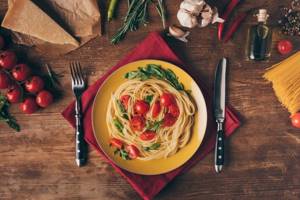
What is the essence of proper nutrition?
The most important thing is to follow the regime, adhering to certain principles, and make sure that the products entering the body are fresh and of high quality.
When forming your daily diet of proper nutrition, rely on simple rules :
1) Every day you must eat five food groups :
- cereals, grains;
- fresh fruits;
- meat, offal, eggs;
- vegetables;
- dairy products.
In order for nutrition to be healthy, it is important to control the balance of substances entering the body. By eating one product from each group daily, you can easily achieve this.
2) It is necessary to separate foods for breakfast, lunch and dinner.
For breakfast, it is better to eat dairy products, grains or cereals. For lunch - meat and fresh vegetables. For dinner - lighter but satisfying foods (fish, stewed vegetables, fermented milk products).
3) You can’t refuse snacks
Snacks are second breakfast, afternoon snack, late dinner. The names are different, but the essence is the same. You can snack on fruits, juices, vegetables, and dairy products.
Proper nutrition regimen
Even an adult on a diet should follow a reasonable diet:
- Ideally, food should enter the orgasm once every four hours, but if this does not happen, digestive disorders begin, ultimately leading to more serious problems.
- The correct eating regimen is five times a day: three main meals and snacks.
- The diet must contain fats, proteins, carbohydrates and fiber.
- Every day you need to drink water in the amount of 40 ml per kilogram of weight.
Diet for weight loss
The basic rule for those who want to lose weight is that the diet must be balanced. The total calorie content of meals per day for those losing weight is 1700 kilocalories. It is advisable to eat three times a day:
- Eat within half an hour when you wake up. At breakfast, the body should receive approximately 25% of the daily kcal value, so the food should be dense: porridge, muesli, cheese, eggs, dairy products and fiber.
- At lunch, calories should be 50%. The plate should be filled a quarter with protein foods (meat or fish), the same amount with a side dish of carbohydrates (rice, buckwheat or potatoes), and half with fiber (cabbage, cucumbers, tomatoes).
- For dinner, target 25% of your calories. A good option is seafood with vegetables, cottage cheese, and lean fish dishes. Don't eat carbohydrates at night: while you sleep, they will turn into fat.
- A proper diet for weight loss cannot do without snacks. The first time you can eat a light snack 2 hours after breakfast, the second time after lunch. Any snack should be within 100 kcal.

Sample healthy nutrition menu
If you follow the right diet and a clear schedule, you can get your body into excellent physical shape in a few weeks.
It is important not only to eat healthy food, but also to exercise and be sure to sleep 7-8 hours a day. Beginners can create a proper nutrition menu for the day, and the next day - make minor adjustments to it
A rough plan should look like this:
- In the morning, organize a hearty breakfast. Eat milk porridge, muesli with yogurt, a piece of tofu with an egg, or some lean fish.
- After two hours, have a snack at work: drink a glass of milk or make a smoothie.
- At noon, treat yourself to seafood soup, a piece of beef and rice.
- For lunch, dried fruits, nuts, a bun.
- In the evening, give preference to chicken with vegetable salad, and you can drink a glass of red wine.
What needs to be changed in your daily routine: first steps
The information obtained can be used to determine where to start making changes. Even small modifications can go a long way toward ensuring your health, productivity, and immunity.
- If the answers to all six questions vary by plus or minus 2 hours or more over the course of a week (differences between weekdays and weekends), then you have some work to do.
- How many hours do you devote to sleep every day? According to the US National Sleep Foundation, adults should get at least 7 hours of sleep at night, and children should get at least 9 hours of sleep at night. If you're sleeping less and waking up tired in the morning, then the first thing you need to do is force yourself to go to bed earlier or create a daily routine that allows you to wake up at least 30 minutes later in the morning. If you sleep more than 7 hours, but after waking up you still feel sleepy, this may be a consequence of the quality of your rest not being good enough.
- Pay attention to the total number of hours your digestive system is working. Take data from your earliest and latest meals for the entire week and exclude extremes that fall outside your “normal routine.” This will determine the period of time during which your digestive tract usually remains ready to process food.
If this period lasts longer than 12 hours, then the good news is that you can make changes that will have the most beneficial effects on your health for the rest of your life. If you can achieve an 8-11 hour eating window almost every day , this regimen will bring invaluable benefits to your health.
- Match the time of your last bite/sip with your bedtime. Ideally, the difference should be at least 3 hours.
Advertising
The result of an hourly diet for a week

The weight will come off faster if you combine a diet with physical activity - and you don’t have to sign up for a gym; in the first few days, it’s enough to exercise responsibly at home and run in the morning and/or evening.
It is also worth noting that the more excess weight you have, the faster it will go away. However, once a certain limit is reached, progress will slow down. You shouldn’t reduce your caloric intake at the same time, have patience, and progress will continue.
Finally, it is necessary to say about such an important feature of the diet as the habit of eating in small portions - this, by the way, is one of the key points in maintaining a long-term effect. With constant overeating, the stomach stretches, and with prolonged meals of 100-200 grams, it returns to normal size again, as a result, satiety comes earlier and the likelihood of overeating, and therefore stretching the stomach again, is significantly reduced
How to eat on an hourly diet - watch the video:
Many people who want to lose excess weight try to do it in the shortest possible time. Of course, you want to get your body in order in a few days, but this approach to solving the problem often leads to the opposite results - the lost kilograms are returned with a reserve. Specialists advise taking your time and using the optimal regime for losing weight.
What time do you eat your last bite or drink your last sip?
In the evening, the brain and organs responsible for metabolism must switch from activity mode to rest mode. The last bite or sip at the end of the day signals the body to prepare to stop vigorous activity in order to begin cleansing and rejuvenating.
It takes several hours for the brain and body to accept the message and switch to another mode: they need to make sure that no more calories will enter the body. Therefore, just like a cup of coffee starts your metabolic clock, the last bite of something you eat or sip of drink goes through the entire processing process within 2-3 hours, and only then the body gets the opportunity to begin its repair and rejuvenation.
One of the main tools for managing diet is cultural traditions. Although many people in the United States eat dinner early, American culture has a tradition of eating late. In many Eastern countries and some places in Europe, late dinner is the norm. In some cultures, late dinners are the largest meals of the day, while in others it is common to serve something light or leftover from lunch at this time.
When you start this challenge, you may think that you already have an established eating routine, but my research shows that in most cases this is not the case. We use food when we need to recharge our batteries or relax, and on weekends we stay up late in various meetings.
What time do you turn off all displays?
Just 50 years ago, when a person left the living room, it meant he was going to bed. Even in the early years of television, there were very few late night shows. Many television stations went off the air immediately after their primetime broadcasts ended. But today, with social media, television and streaming media players on digital devices running 24/7, you need to know exactly when to leave the virtual party.
After we turn off all gadgets, the brain needs a certain time to relieve stress. Our eyes receive a significant portion of the total amount of light from electronic displays, so turning them off can be considered as the time when all light channels to the brain are blocked.
Hourly diet menu for a week
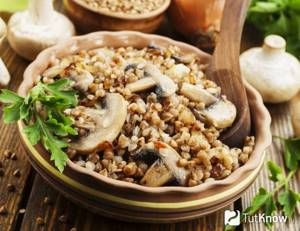
We will schedule meals for meals every 2 hours; if you choose a 3-hour diet, you can simply transfer some of the snacks to increase the portion of the main meals.
Monday
- 7:00 - oatmeal porridge with water and berries;
- 9:00 - orange;
- 11:00 - chicken fillet and cucumber slices on whole grain bread;
- 13:00 - mushroom soup;
- 15:00 - steam omelette;
- 17:00 - vegetable salad;
- 19:00 - dried fruits;
- 21:00 - kefir.
Tuesday
- 7:00 - buckwheat porridge with mushrooms;
- 9:00 - kiwi;
- 11:00 - baked turkey fillet with sliced vegetables;
- 13:00 - vegetable cream soup;
- 15:00 - toast with lean ham, preferably homemade;
- 17:00 - vinaigrette;
- 19:00 - walnuts;
- 21:00 - fermented baked milk.
Wednesday
- 7:00 - rice porridge;
- 9:00 - pear;
- 11:00 - boiled fish with broccoli;
- 13:00 - cabbage soup with chicken breast broth;
- 15:00 - toast with low-fat cheese and tomato slices;
- 17:00 - Greek salad;
- 19:00 - almonds;
- 21:00 - yogurt.
Thursday
- 7:00 - steam omelette with chopped vegetables;
- 9:00 - apple;
- 11:00 - steamed chicken cutlet, a slice of whole grain bread;
- 13:00 - fish soup without potatoes;
- 15:00 - natural yogurt with fruit;
- 17:00 - vegetable salad;
- 19:00 - cashews;
- 21:00 - kefir.
Friday
- 7:00 - homemade honey granola with kefir or natural low-fat yogurt;
- 9:00 - peach;
- 11:00 - toast with homemade fish pate and cucumber;
- 13:00 - mushroom soup without potatoes;
- 15:00 - boiled egg;
- 17:00 - salad of beets, carrots and cabbage;
- 19:00 - dried fruits;
- 21:00 - natural yogurt.
Saturday
- 7:00 - low-fat cottage cheese with berries;
- 9:00 - grapefruit;
- 11:00 - chicken fillet stewed with vegetables;
- 13:00 - broccoli soup;
- 15:00 - rye bread toast with chicken breast and tomato;
- 17:00 - vegetable salad;
- 19:00 - pistachios;
- 21:00 - yogurt.
Sunday
- 7:00 - oatmeal with water and berries;
- 9:00 - kiwi;
- 11:00 - vegetable and seafood salad;
- 13:00 - beetroot soup without potatoes;
- 15:00 - steam omelette;
- 17:00 - Greek salad;
- 19:00 - dried fruits;
- 21:00 - kefir.
Also keep in mind that if you snack on nuts and/or dried fruits, you need to go far from the upper portion limit - eating 100 grams of nuts is clearly not worth it, they are very filling and high-calorie, 20-30 grams will be enough.




